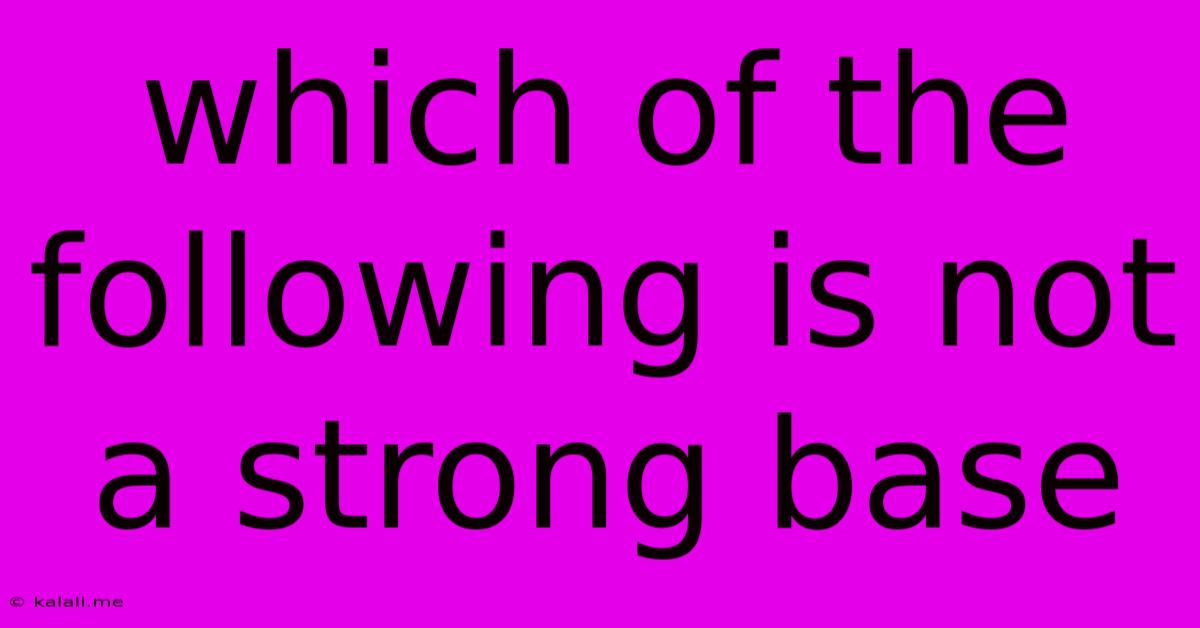Which Of The Following Is Not A Strong Base
Kalali
Jun 16, 2025 · 3 min read

Table of Contents
Which of the Following is NOT a Strong Base? Understanding Acid-Base Chemistry
This article will delve into the concept of strong bases and explore why certain compounds don't fit the criteria. Understanding the difference between strong and weak bases is crucial in chemistry, impacting various applications from industrial processes to biological systems. We'll examine the definition of a strong base, discuss common examples, and identify which from a given list wouldn't be classified as such.
What is a Strong Base?
A strong base is a substance that completely dissociates in water, releasing a high concentration of hydroxide ions (OH⁻). This complete dissociation is key; it's what distinguishes strong bases from their weaker counterparts. The resulting solution exhibits a high pH, typically above 7, indicating alkalinity. The strength of a base depends on its ability to accept protons (H⁺) or donate hydroxide ions.
Common Examples of Strong Bases:
Several inorganic compounds qualify as strong bases. These include:
-
Group 1 Hydroxides (Alkali Metal Hydroxides): These are the quintessential strong bases. Examples include Lithium hydroxide (LiOH), Sodium hydroxide (NaOH – also known as caustic soda), Potassium hydroxide (KOH – also known as caustic potash), Rubidium hydroxide (RbOH), and Cesium hydroxide (CsOH). These readily dissolve in water to produce a high concentration of OH⁻ ions.
-
Group 2 Hydroxides (Alkaline Earth Metal Hydroxides): While generally less soluble than Group 1 hydroxides, those that do dissolve completely act as strong bases. This includes compounds like Barium hydroxide (Ba(OH)₂), Strontium hydroxide (Sr(OH)₂), and Calcium hydroxide (Ca(OH)₂), although the latter is less soluble and therefore considered a less potent strong base compared to the Group 1 hydroxides.
Identifying a Weak Base:
Weak bases, on the other hand, only partially dissociate in water. This means they produce a lower concentration of hydroxide ions compared to strong bases at the same concentration. Consequently, their pH is less alkaline. The equilibrium between the undissociated weak base and its ions determines the extent of hydroxide ion production.
Examples of Weak Bases:
Numerous organic and inorganic compounds act as weak bases. These include:
-
Ammonia (NH₃): Ammonia reacts with water to form ammonium ions (NH₄⁺) and hydroxide ions, but the equilibrium strongly favors the undissociated ammonia molecule, resulting in only a small concentration of OH⁻.
-
Many organic amines: Amines, compounds containing a nitrogen atom bonded to one or more alkyl groups, often act as weak bases. The presence of electron-donating alkyl groups influences the base strength, but they typically do not completely dissociate in water.
Determining Which is NOT a Strong Base from a Given List:
Without a specific list provided, I cannot definitively say which compound is not a strong base. However, if the list includes any of the weak base examples mentioned above (ammonia or organic amines), or other compounds known for their incomplete dissociation in water, then those would be the ones not classified as strong bases. Look for compounds that don't fall into the Group 1 or highly soluble Group 2 hydroxide categories. Consider the compound's chemical structure and its known behavior in aqueous solutions.
By understanding the definition of a strong base and the properties of common strong and weak bases, you can accurately identify which substances fit the criteria. Remember, the key characteristic is complete dissociation in water, leading to a high concentration of hydroxide ions.
Latest Posts
Latest Posts
-
Select The Term With The Correct Spelling
Jun 16, 2025
-
If Qt Is Perpendicular To Pr
Jun 16, 2025
-
History Multiple Choice Questions And Answers Pdf
Jun 16, 2025
-
American University Of Paris Acceptance Rate For International Students
Jun 16, 2025
-
Which Of The Following Statements Is True Of Lake Victoria
Jun 16, 2025
Related Post
Thank you for visiting our website which covers about Which Of The Following Is Not A Strong Base . We hope the information provided has been useful to you. Feel free to contact us if you have any questions or need further assistance. See you next time and don't miss to bookmark.